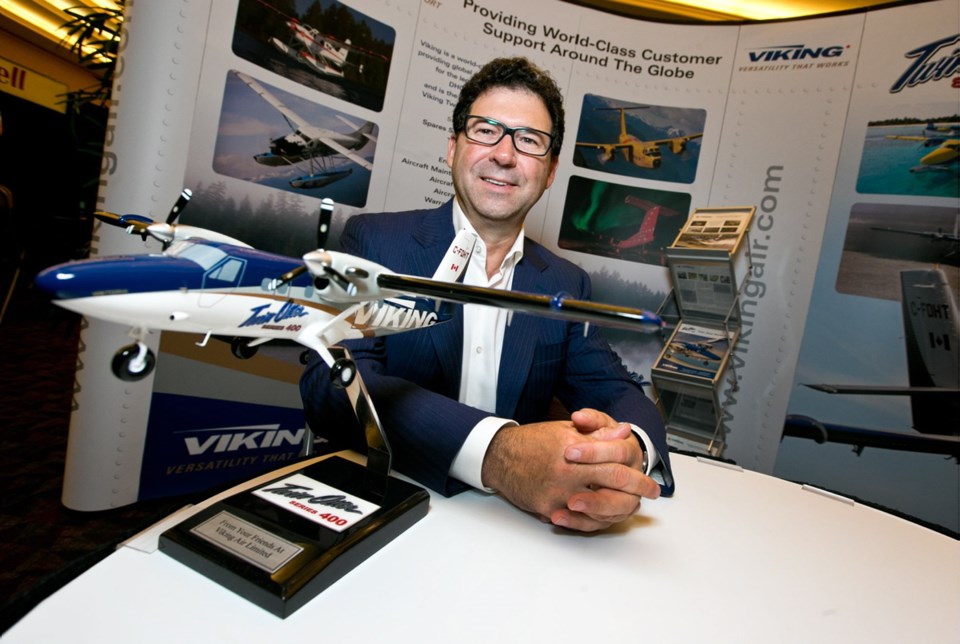North Saanich-based Viking Air has signed a deal in Moscow to manufacture 10 Twin Otter planes for a major Russian petroleum company, with the first aircraft delivered as soon as November.
The agreement was announced Tuesday at the start of Viking’s three-day operators’ forum at the
Victoria Conference Centre. The event has attracted 500 delegates from around the world, including Sri Lanka, China and Russia.
Viking president and chief executive Dave Curtis is not divulging the value of the contract with RN-Aircraft, a subsidiary of Rosneft, which bills itself as the world’s largest publicly traded petroleum company. It is based in Krasnoyarsk, Russia.
But it’s clear that the total contract value will be significant. Each Series 400 Twin Otter has a base price of $7 million. Viking also provides specialized equipment for each plane as well as spare parts, servicing and training.
“Any kind of deal that involves 10 aircraft is important,” Curtis said.
The agreement delivers a second major boost this summer for the company, which laid off 116 employees in April, most at its manufacturing headquarters near Victoria International Airport. Russian economic troubles and the global slide in the oil and gas sector were behind the layoffs.
In June, Viking announced that it will be expanding into China after a deal with Beijing’s Reignwood Aviation Group to buy 50 Twin Otters during the next five years.
Viking is optimistic that sales in China will continue growing. It predicts sales to that country will climb to 500 aircraft in the next 20 years, leading to about $3.5 billion in sales.
The contract with the Russian company meant Viking had to navigate special sanctions imposed by Canada last year in response to Russia’s actions in Ukraine.
“Given the challenging geo-political situation between Canada and Russia, it was a very challenging deal to put together to ensure we were totally in compliance with all of the current sanctions and prohibitions on doing business with Russia,” Curtis said. “It took a tremendous amount of time to negotiate the contract, including consultation with all our external advisers in making sure that we were in compliance with all of the trade law.”
Viking sees Russia as a huge potential market and has already delivered eight Twin Otters to that country, Curtis said.
Curtis first met with Rosneft 18 months ago. “This contract was literally signed last week in Moscow.”
RN-Aircraft will use the 19-passenger planes to transport workers to and from its drilling sites, Curtis said. The company is replacing helicopters for the Twin Otters. The planes will be based in south-central Russia and will also be used as corporate shuttles and cargo transporters.
This agreement also highlights the opportunity for a Twin Otter facility in Russia, which was first raised in 2010. Discussions are continuing between Viking and Moscow’s Series 400 sales representative, Vityaz Avia, about the possibility of opening such an operation to provide maintenance, warranty and service support. “We need to have people there to help fix and maintain [the aircraft],” said Curtis.
A Russian facility would not replace Canadian manufacturing operations, but might include some final finishing of aircraft, Curtis said. He expects two Twin Otters will be delivered this year to RN-Aircraft, with the remainder supplied in 2016 and into early 2017.
China is slated to take delivery of two Twin Otters in late December, Curtis said.
By the end of this year, Viking will deliver 20 Twin Otters to various customers.
Prior to the cuts in spring, the company had been producing 24 finished planes per year. It now plans to work toward about 18 per year, Curtis said.
Currently Viking, which also has a manufacturing operation in Calgary, has 550 employees, with 430 in North Saanich, he said.
Since the layoffs, staff numbers have essentially been stable. “Because it was so hard to lay people off, I’m being very, very careful on letting the rate come up again because I don’t want to have to do that again,” Curtis said.



